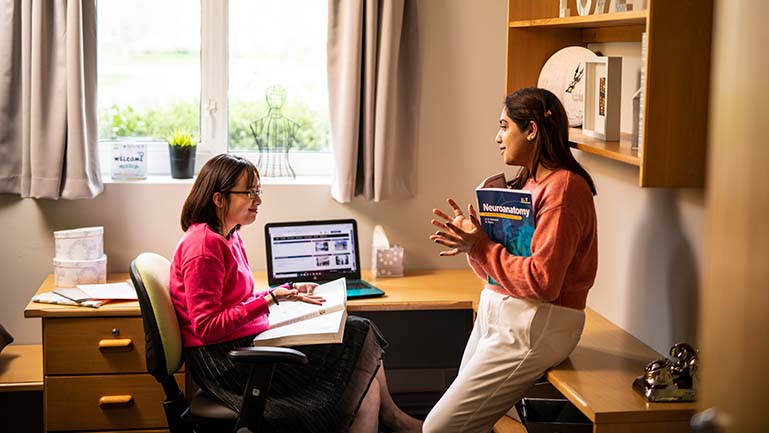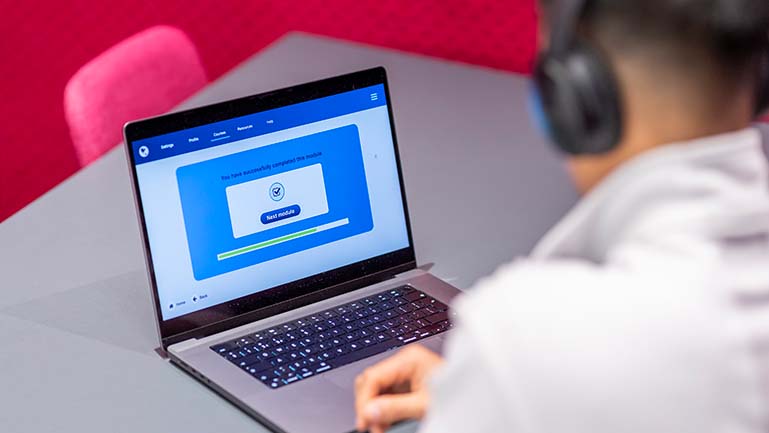Guide and strategies to improve your active listening abilities
Guide and strategies to improve your active listening abilities
29th Jan 2024 |
Active listening is key to comprehending the context, finding the right answer, and being assertive, especially when taking an exam. This skill will also make your personal life easier and be very useful in professional and academic aspects. That is why in this article we will present a guide with strategies to improve that ability, mainly related to the learning process and when preparing for the IELTS.
What is active listening and how is it useful?
Active listening is a communication skill that implies giving your full attention to someone when they are talking to you. It is not just hearing their words but also understanding their feelings, thoughts, and the message behind what they are saying.
Here are some reasons why you should work on this ability:
- In the context of the IELTS, it allows test-takers to capture essential details, identify key information, and respond accurately to questions.
- It not only contributes to a higher score on the IELTS but also enhances one’s overall language proficiency, as it sharpens the ability to engage with and understand spoken English, a vital skill for anyone aiming to work or study in an English-speaking environment.
- Beyond the IELTS, it plays a pivotal role in daily life. It fosters better interpersonal relationships since it involves giving full attention to the speaker, empathizing with his or her perspective, and responding thoughtfully.
- In professional contexts, active listening enhances one’s ability to grasp instructions, provide relevant solutions, and engage in productive teamwork.
Strategies to improve active listening
Now that you know the importance of active listening, we will present you with some strategies to enhance it when taking the IELTS.
1. Get to know the types of questions
Even if you are proficient in English, when taking the IELTS you must get to know its structure to obtain a good score. The listening format test is the same for Academic or General Training. You have 30 minutes to complete this section of the exam, which is composed of 40 questions.
There will be 4 recordings, covering different matters: everyday English conversation, a monologue, a conversation between 2-4 people regarding an academic context, and a monologue on an academic topic.
Here are some examples of what you can expect:
- Recording 1: You will hear a conversation between two people in a social context, such as booking tickets or making reservations.
- Recording 2: You will listen to a monologue, typically in a public setting like a museum or tourist information center.
- Recording 3: This part usually features a conversation between two or more people in an academic setting, often a discussion about a research project or presentation.
- Recording 4: This section presents a lecture, often related to a university course. It can be on a wide range of topics, from science to history.
Remember that you will only listen once to each audio, so you must remain attentive to get the main information.
2. Take notes strategically
You are allowed to take notes during the recordings, and it is a good strategy when practicing at home. Focus on keywords, numbers, and any details that might be relevant to answering questions. Develop a system of shorthand symbols or abbreviations to save time.
It is also helpful to carefully read the question before the recording starts so that you can have some context and identify what you must look for. You can, as well, underline keywords on your question sheet.
3. Use diverse listening resources
Expand your horizons by listening to a wide range of English audio materials. This can include podcasts, TED Talks, news broadcasts, and documentaries. Diversifying your sources will expose you to different accents, vocabulary, and speaking styles.
Please note that to create a habit, in this case, preparing for the IELTS and enhancing active listening, is key to making it sustainable and enjoyable. This is why you should listen to things you like.
Besides educational resources, you must get involved in real-life situations, such as voice notes, calls, talking to someone in a non-academic related context, etc.
4. Improve your vocabulary
A rich vocabulary is essential for understanding spoken English. Regularly working on expanding it will make it easier to grasp unfamiliar terms during the test.
You should also look for synonyms. They can help bridge comprehension gaps when you encounter unfamiliar words or expressions. If you can recognize synonyms, you are more likely to deduce the meaning of unknown words from the context.
5. Paraphrasing
Paraphrasing can be highly beneficial for active listening because it demonstrates your understanding of the speaker’s message. When you do it, you rephrase their ideas in your own words. This allows you to confirm your comprehension of their message. It also:
- Serves as a tool to clarify ambiguous or complex statements. If you encounter a part of the conversation or lecture that is unclear, paraphrasing it more simply can help you grasp the speaker’s intended meaning.
- Keeps you mentally engaged in the conversation or audio material. Instead of passively hearing words, you are actively processing and interpreting the information. This heightened engagement enhances your overall listening experience and score.
- Paraphrasing helps with memory retention. By summarizing and rephrasing key points during a conversation or lecture, you are more likely to remember and retain the information.
- It is a valuable skill for both daily interactions and situations that require strong listening skills, such as academic exams like the IELTS and personal situations (misunderstandings, conflicts, etc.).
6. Identify main ideas and details
Work on your ability to identify main ideas and supporting details while listening. Focus on discerning the speaker’s purpose and the central message of the audio. This skill is crucial for answering various question types and if you are running out of time.
7. Analyze the context
You should also analyze the speaker’s attitude and tone of voice (if they seem happy, upset, etc.), among others, to determine the right path when answering the questions. Even if you don’t know the correct answer at once or understand every single word, you can infer it from the context.
This not only applies to the IELTS but can be transferred to real life. For example, when you talk to someone face-to-face, you can read their emotions to determine their true feelings and intentions by their body language, expressions, and voice.
8. Be fully present
We know that this might seem kind of obvious but try to be relaxed and don’t stress out about the time limit or thinking about the score that you want to get. Just focus on what is happening now and the recordings or the speaker. You can practice mindfulness or breathing techniques to overcome or control your anxiety.
When you are fully present in what you are doing, everything becomes more productive and people notice it too, because you seem to be paying attention and interested in the conversation and what the others intend to tell you. ¡This is the essence of active listening!
9. Seek feedback
Practice with a study partner or tutor who can provide feedback on your listening skills. They can help you identify areas for improvement and offer valuable insights.
Don’t forget that sample questions and practice material are really helpful. You can check the ones that we have for you:
10. Audio scripts
When studying for the IELTS and practising active listening, audio scripts become your allies. Here are some of their advantages:
- Reinforce understanding: reviewing the script enables you to see the words in written form, making it easier to clarify any unclear portions, unfamiliar vocabulary, or complex sentences.
- They provide a reference point to verify your answers. After attempting the questions, you can cross-check your responses against the script to ensure accuracy.
- By comparing your responses to the audio script, you can identify any errors. This self-assessment helps you recognize areas where you may need to improve your active listening skills, such as recognizing accents or identifying key details.
- You can study the script to understand how native speakers express ideas, use sentence structures, and convey information, helping you become more attuned to English language patterns.
- You can look up unfamiliar words and phrases, understand how they are used naturally, and incorporate them into your vocabulary, improving your language skills for future listening tasks.
You are ready to go!
Now you have all the strategies that you need to improve your active listening skills, not only for the IELTS, but to show empathy and understanding when talking to someone else.
Visit the IELTS Canada homepage to find out more
Related articles:

